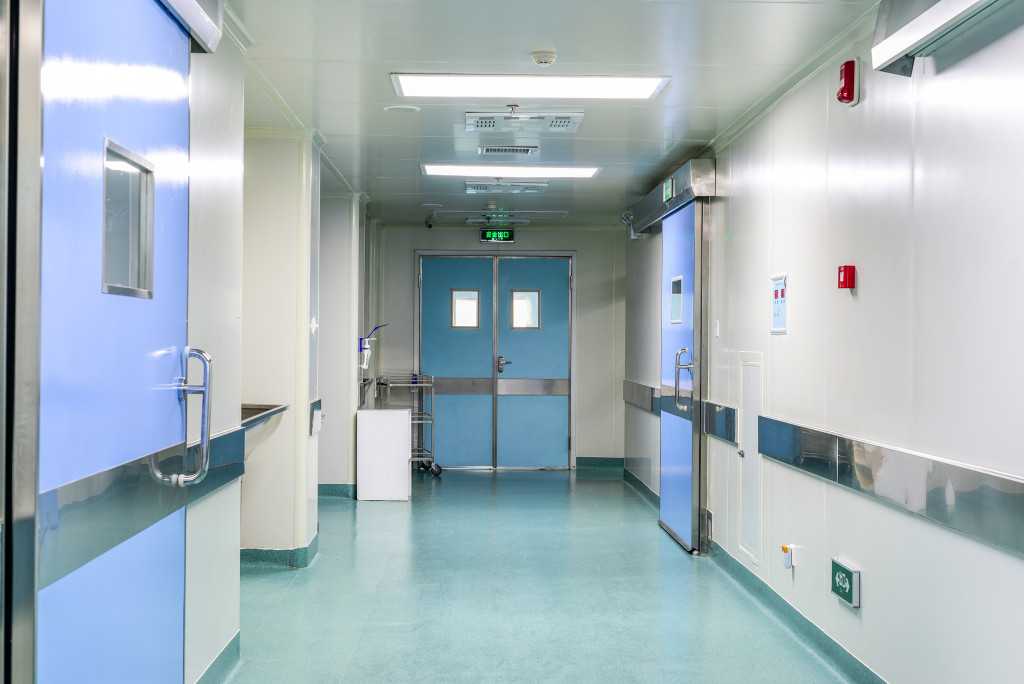Every day, hundreds go in and out of a healthcare facility. Added to that are the various seen and unseen contaminants in the environment. For this reason, these businesses cannot take their interior design for granted, including the type of commercial flooring they use.
Of the many possible choices, healthcare facilities often pick vinyl floors.
What Is Vinyl Flooring?
Vinyl flooring is produced by combining polyvinyl chloride (PVC) with different compounds to create a plastic material. There are several variations:
- Solid vinyl (or monolayer) is made of 100% PVC.
- Vinyl plank and tile are manufactured with a core that can be wood, fiberboard, or other material. This provides the flooring with extra strength and stability. The outer layer is still 100% PVC.
- A vinyl sheet comes in rolls and can be cut to size. It is also mainly made of 100% PVC but can be combined with other compounds to enhance its durability or elasticity.
Vinyl floors are also resilient floors. This means when you touch the material, it is firm. However, it also has a certain bounce to it. In other words, it can be bendable or flexible.
Because of this, some people confuse vinyl with linoleum. But they are not the same. Linoleum is made of organic and natural components like wood flour, cork powder, ground limestone, linseed oil, and jute – not PVC.
Why Vinyl Floors Are Great for Healthcare Facilities
Vinyl floors have remained a popular option for many homes and businesses over the years. They are especially well-known in healthcare facilities. Here’s why:
1. Vinyl Floors Are Antibacterial
One of the most important benefits of vinyl flooring is that it is antibacterial. It resists the growth of bacteria and fungi. This keeps patients, staff, and visitors from being exposed to germs that can cause various illnesses. Vinyl floors are also easy to disinfect for proper hygiene.
Further, vinyl flooring doesn’t have crevices that can trap contaminants, keeping them from being blown or washed away. Spills are easy to clean up as well.
2. Vinyl Floors Are Chemical Resistant
Vinyl resists several chemicals and cleaners, including chlorine bleach and other harsh detergents often used in areas where healthcare is provided. This makes it ideal for hospital and clinic flooring.
They are also quick to clean. For instance, when a spill happens on the floor, you can wipe it up instantly. This is important for a place with high foot traffic, up-and-about staff, and patients at a high risk of suffering injuries from falling.
3. These Floors Are Durable and Economical
Vinyl flooring is long-lasting and durable, making them ideal for health care facilities where daily traffic occurs. It can withstand foot traffic for up to 14 years. It also doesn’t dent or scratch easily.
Because vinyl floors can last this long, healthcare facilities would find them an economical choice. This is good news at a time when administration costs are increasing. Hospitals still need to earn money to operate. It will grab every opportunity to boost its revenue.

4. Vinyl Floors Are Easy to Maintain
One of the advantages of vinyl floors is their ease of maintenance. It is quick and easy to clean. A mop with cold water and a mild detergent will do the trick in removing dirt, spills, and contaminants.
It also resists stains from spilling coffee or tea, making it ideal for areas where people often come together in groups to have high-energy chats over snacks and beverages. With vinyl floors, your cleaning staff will find it easier to keep the facility looking great.
5. They Are Slip Resistant and Comfortable for People
Another benefit of vinyl flooring is that it is slip-resistant and comfortable underfoot. Hence, for patients and visitors wearing socks or stockings with open-back shoes, you won’t have to be worried so much about them tripping and falling. It will also help to reduce the risk of falls from patients who have mobility issues.
Vinyl floors are also not that sensitive to temperature. They don’t become too cold. Hospitals can also opt for well-insulated vinyl planks, which are flooring material with underlayment. This way, they can remain warm even in the winter, something significant for hospitals in the UK.
All these don’t mean that vinyl floors are flawless. They also have limitations, such as their tendency to release volatile organic compounds (VOCs). However, in many ways, the benefits outweigh the downsides.
To sum up their benefits, these floors are antibacterial and chemical resistant. They also last longer, as well as resist stains and spills. Plus, vinyl floors are easy to maintain and comfortable underfoot.







